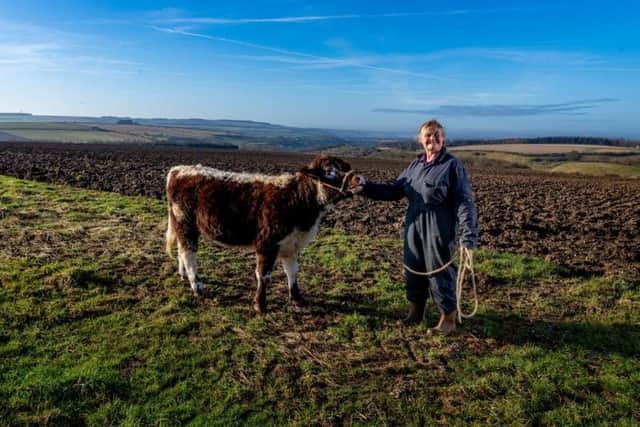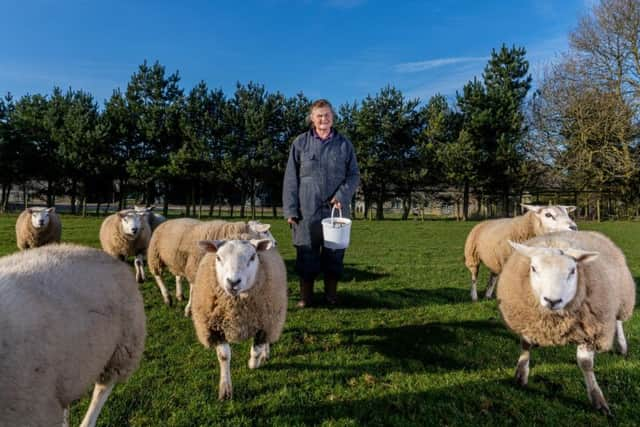Wolds farmer who is determined to put meat back on people's plates with her February 'Meatury'
There are also those who, in today’s society of democratic acceptance, are trying to play things cool, realising that to go on all-out attack will probably end up alienating.
Television and social media is having a field day with the subject matter, not necessarily because those producers believe in lentils above lamb or beetroot over beef, it just makes ‘good telly’ and in today’s fragmented media world there is a rush for anything that will provide two contrasting sides to the story.
Advertisement
Hide AdAdvertisement
Hide AdRuth Russell, who farms in partnership with her father John Harrison, at Duggleby High Barn on the edge of the beautiful Yorkshire Wolds, has decided it is time to strike a blow for livestock producers.


Another twist in Malton market’s sagaFormer rugby player and livestock farmer learning the ropes in arableRuth and John, with assistance from her husband, Andrew, run the 327-acre predominantly arable farm up high, as its name suggests, on the Wolds where they also have a pedigree herd of Longhorn cattle that produces high quality beef for hotels and restaurants in London.
Ruth’s mission, officially starting today, is of this month being ‘British Meatruary’.
“Over the last few months I’ve been quite frustrated about the negative media regarding livestock,” says Ruth, who has been full-time on the farm since 2005.
Advertisement
Hide AdAdvertisement
Hide Ad“Quite a lot of the media has been incorrect, and nobody seems to have been addressing that.


“I had this little spark and thought if I don’t, who will? I read a piece about Veganuary and while I appreciate the vegans’ opinion there were certain things in their statements that I thought were incorrect.
I just thought, I just need to get our message across as livestock producers, so that’s how ‘British Meatruary’ has come about.
“I want to raise awareness of sustainable farming in Britain. I don’t want to change the views of vegans, I want to encourage meat eaters to be more aware of what they are buying.
Advertisement
Hide AdAdvertisement
Hide Ad“Unfortunately, there is a demand from consumers for cheap meat, which means imported or intensively reared meat. The only way to combat that is for consumers to realise that, and hopefully we can convert some of them to buy from more sustainable sources. We are importing meat from all over the world, which seems crazy.
“Some of the false facts that I would like to address are about the emissions from British livestock, which produces two and a half times smaller CO2 emissions than the world average at only four and a half per cent of our nation’s total emissions, agriculture’s total emissions are lower than household emissions.
“It seems strange that we (livestock farmers) seem to be picked on when we are not the worst culprits.
“Grazing cattle is also an effective way of managing a carbon sink. You would ruin all these pastures and large areas of grassland if you tried to plough them up and sow them all with vegetables, which some vegans seem to be suggesting.
Advertisement
Hide AdAdvertisement
Hide Ad“Many areas grazed by animals are totally unsuitable for any form of arable production.”
Ruth isn’t some kind of media machine in the making, she is a farmer who is distressed presently, like many in her position, that the media focus appears to be slanted towards those who are keen to not just promote the vegan way of life, but also popularise activism against livestock producers.
“‘I’m just trying to do what I can, so anywhere I can I am handing out my ‘British Meatruary’ leaflets and I’m hoping the word will spread.
“I’ve been in touch with my local NFU for their help and I’ve sent out emails to people who are well known who I think might get behind it like Amanda Owen, the Yorkshire Shepherdess.
“There’s nothing more sustainable than her farm.
Advertisement
Hide AdAdvertisement
Hide Ad“I’m not actually on Facebook so my sister has put ‘British Meatruary’ on for me and it is getting shared on there.”
The herd of Longhorn cattle at Duggleby High Barn started by Ruth’s father John in 1995 now runs to around 60-70 head with followers raised extensively with two summers out to grass and reaching the food chain at between 24-30 months.
“They are a slower maturing animal that fit in perfectly for our work involved with the higher level stewardship scheme,” says Ruth.
“The Longhorn is an easy calving, hard-mouthed animal that is very capable of grazing the tough grasses found in the dale land we have, where it would be impossible to grow vegetables and would cause even more emissions through additional farm machinery that would have to be used if tried, and the crop would still fail.”
Advertisement
Hide AdAdvertisement
Hide AdRuth and John also have a small purebred Texel flock producing tups to sell at local sales and buy in gimmer lambs to graze on three-year leys in with their arable rotation. Arable crops include wheat, barley and oats across 277 acres.
Duggleby High Barn is a farm that embraces wildlife and stewardship with six-metre field margins around its arable fields, pollen and nectar areas and offers the perfect site for nesting lapwings, skylarks and curlews.
It is also home to yellowhammers, tree sparrows, buzzards, pheasants and grey partridges.
“I host school visits every year,” says Ruth. “We fully understand the importance of education and we have had all school ages from primary school to A level students.
Advertisement
Hide AdAdvertisement
Hide Ad“The best time to come is through the summer months as there is so much to see from the crops to the animals and the wildlife. It’s sad that A level students no longer now receive the funding to come here as they are the decision makers of the future.
“I do like to fight causes,” says Ruth. “And I hope that others will join with me today in getting the livestock farmers message across with ‘British Meatruary’.”